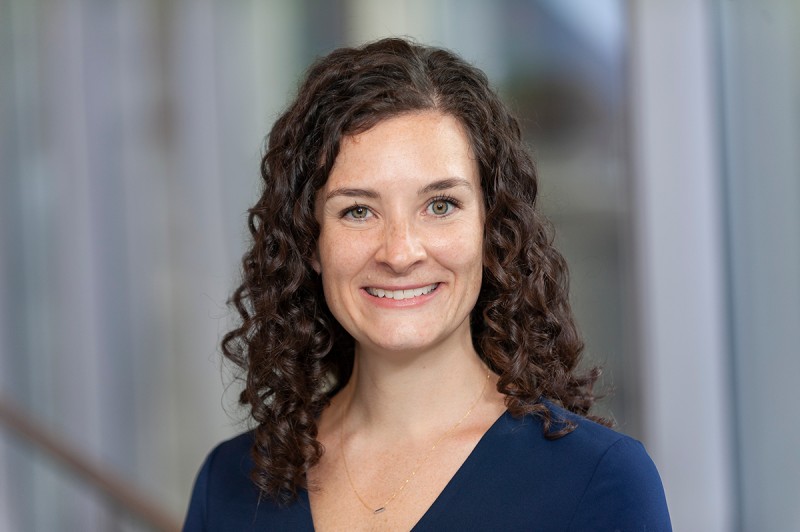
Dr. Lindsey Roeker specializes in treating people with chronic lymphocytic leukemia (CLL).
Hematologic oncologist Lindsey Roeker, MD, specializes in treating people with blood cancers such as leukemia, including chronic lymphocytic leukemia (CLL). She sees patients at Memorial Sloan Kettering Cancer Center (MSK) in Manhattan and at the Long Island location in Commack (also known as the MSK Commack Nonna’s Garden Foundation Center).
We recently spoke with Dr. Roeker about chronic lymphocytic leukemia and MSK’s expertise in treating it.
What is chronic lymphocytic leukemia, and how is it different from other types of leukemia?
Chronic lymphocytic leukemia is the most common type of leukemia. About 20,000 people in the United States are diagnosed every year, and CLL is most common in older adults. Chronic lymphocytic leukemia occurs when the body makes too many B cells, a type of white blood cell that is part of our immune system. The cancer is often found in the blood and bone marrow, as well as the lymph nodes and spleen.
Many people don’t have symptoms and have no idea that anything is wrong at the time they’re diagnosed. The disease is usually detected when someone gets a blood test as part of a regular checkup, and they are found to have an elevated white blood cell count.
Some leukemias, such as acute lymphocytic leukemia and acute myeloid leukemia, need to be treated urgently, but chronic lymphocytic leukemia is treated only when it causes symptoms. About a third of people who are diagnosed will never have symptoms and never need treatment. But the rest ultimately will. CLL is not a curable disease. As its name suggests, it is a chronic disease. But experts in the field have several ways to keep it under control, and MSK has some of the best chronic lymphocytic leukemia doctors in the world.
What are the symptoms of chronic lymphocytic leukemia?
The symptoms of CLL include persistent fevers, night sweats, abdominal fullness, bothersome lymph node enlargement, and weight loss. As the disease advances, people may be more prone to infections and bleeding because their bone marrow isn’t working properly.
Rarely, chronic lymphocytic leukemia can turn into a more aggressive type of lymphoma. This is called Richter’s transformation or Richter’s syndrome. It’s usually a life-threatening condition that requires urgent treatment.
What if you’ve just been diagnosed with chronic lymphocytic leukemia and don’t have any symptoms?
Even if you are asymptomatic and your doctor says you don’t need treatment, it’s important to see an expert in CLL soon after you are diagnosed.
MSK has a great deal of experience in determining how closely someone needs to be monitored if they don’t have symptoms. Being monitored doesn’t necessarily mean that no action is needed.
MSK offers state-of-the-art diagnostic and prognostic testing. This enables doctors to devise a strategy for each patient from the very beginning. Our patients have access to the newest therapies and any leukemia clinical trials that may help them.
People aren’t expected to give up longstanding relationships with their regular doctors when they come to MSK for CLL care. We partner with doctors in the community. People with CLL still need to receive comprehensive care, like vaccinations to prevent infections and screenings for other health conditions.
For those who develop symptoms, what are the treatments for chronic lymphocytic leukemia?
Targeted, chemotherapy-free approaches have become the best treatment option for many people with CLL and are often used as an alternative to traditional chemotherapy. Approved targeted therapies that specifically target chronic lymphocytic leukemia cells include ibrutinib (Imbruvica®), acalabrutinib (Calquence®), and venetoclax (Venclexta®). Several more drugs are on the way. All these drugs are taken as pills. We also commonly incorporate immunotherapies into the treatment of CLL, including obinutuzumab (Gazyva®) and rituximab (Rituxan®). These are given are intravenously (through an IV, in the vein).
What new chronic lymphocytic leukemia treatments are you most excited about?
Through research studies that have been conducted at MSK, we are learning how to best tailor treatments for patients. I envision that we will soon be able to personalize not only which medications a patient receives but also for how long they receive it. We are working hard to make sure treatments are effective and well tolerated.
We’re also bringing more treatment options for patients who need them. While we have a lot of great approved drugs, some patients need additional options. I am thrilled to be part of a team that is bringing more treatment choices to the table for patients.
What is special about MSK’s approach to treating chronic lymphocytic leukemia?
Our patients have access to more clinical trial options for chronic lymphocytic leukemia than any other place in New York. Through clinical research, we are bringing important new treatments to the field. And through translational research, we’re better understanding how these treatments work — and, importantly, what to do when they stop working. The Leukemia Service and the whole Division of Hematologic Oncology are committed to providing excellent cutting-edge care. We have an incredible team of clinicians and scientists working together to understand the best way to approach chronic lymphocytic leukemia.




